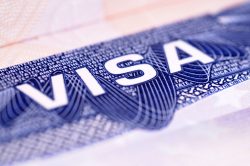Cap Exempt H-1B visas … What to do if your current or prospective employee was not selected in the H-1B lottery?
 I recently had a South Florida-based Financial Services company reach out to me concerning an international student employee of theirs. “David” is a very promising young man from South America who graduated last year with a master’s degree from a top Florida University. Over the past year, while on post-completion F-1 OPT (Optional Practical Training), David became a rising star in their company’s job-training program and developed into a key piece for their Latin American Strategy. They realized he was someone they wanted to hirepermanently but with his F-1 visa and OPT expiring. He would soon no longer have immigration status or work authorization.So they entered David into the March H-1B lottery, but unfortunately, he was not selected. Even though David’s chances of selection increased with a U.S. master’s degree, he was still not one of the 20,000 H-1B registrants in the advanced degree exemption.
I recently had a South Florida-based Financial Services company reach out to me concerning an international student employee of theirs. “David” is a very promising young man from South America who graduated last year with a master’s degree from a top Florida University. Over the past year, while on post-completion F-1 OPT (Optional Practical Training), David became a rising star in their company’s job-training program and developed into a key piece for their Latin American Strategy. They realized he was someone they wanted to hirepermanently but with his F-1 visa and OPT expiring. He would soon no longer have immigration status or work authorization.So they entered David into the March H-1B lottery, but unfortunately, he was not selected. Even though David’s chances of selection increased with a U.S. master’s degree, he was still not one of the 20,000 H-1B registrants in the advanced degree exemption.
Every year there is an annual cap for H-1B visas set at 85,000 and this past Spring, we had a record number of lottery registrants. Normally when companies enter employees or prospective employees into the H-1B lottery, most are not selected and those that are not selected either have to explore other options or wait for the next H-1B season. Employersusually hire a law firm and complete the H-1B petition process for selected employees. What if you were not selected? Every year creative immigration attorneys explore various alternative routes to achieve the visa goals for their clients whose H-1B dice did not roll a lucky “7”. The Cap-Exempt H-1B visa is another less-known immigration solution for such clients.
How does this work? Since the Cap-Exempt H-1B is very complicated, explaining the entire process is quite difficult and best reserved for a consultation. However, I will do my best to briefly break it down.
Advantages of the Cap-Exempt H-1B visa:
- There is no lottery or annual cap
- A Cap-Exempt H-1B visa can be filed at any time (there is no 90-day deadline)
- Once you are in Cap-Exempt H-1B status, you can then file for a concurrent H-1B visa from your company and soon start working for your chosen employer. (This essentially means the employee can get an H-1B visa once they are currently working with a Cap-Exempt H-1B visa)
- You get to mentor U.S. college students, work on innovative educational/research projects in your field, and your company can find a direct source of future employees that you already know.
- This fellowship can be used to build up your qualifications for a green card or another visa.
How do you qualify for a Cap-Exempt H-1B? My law firm collaborates with several educational non-profit organizations that offer part-time fellowships as Cap-Exempt employers. After a consultation and screening, if my client is deemed a good fit, I will have the employer nominate their employee to apply for one of these fellowships. If they are accepted into the program(s), we collaborate together on a Cap-Exempt H-1B petition. Once the H-1B is approved and he starts his fellowship a) David will work part-time (at least 5 hours per week) for the foundation and get paid the prevailing wage according to his job level and b) David’s full-time private employer can then petition for his concurrent H-1B visa.
Remember
- You still must meet the same H-1B qualifications (the job must be a specialty occupation, you must be offered/paid the prevailing wage, and the U.S-based company must be able to pay the prevailing wage)
- You can work with your concurrent H-1B as long as you are still employed in Cap-Exempt H-1B status but you then have to plan to register for future H-1B lotteries or find other visa options once you are no longer employed in cap-exempt H-1B status.
- Not all H-1B candidates are good fits for a cap-exempt H-1 visa and your employer has to really want “you”. Your employer has to be willing to spend the additional time, resources, and money (filing fees, legal fees, premium processing fees, foundation fees) to get your cap-exempt H-1B.
We are fortunate that the USCIS is forward thinking to allow us this unique ability to team up employees with non-profit educational and government research institutions. As employment-based Immigration Attorneys, we serve several important functions. 1) we help U.S. employers hire and retain foreign talent, 2) we help innovative foreign employees come to the U.S. to start their careers and build their American Dream, and most importantly,3) we directly help the U.S. economy innovate and grow with this international influx. Let’s not forget the complicated Cap-Exempt H-1B visa process and requirements really need to be fully understood by both the employee and the employer. It is best to contact an experienced immigration attorney who handles such cases and can explain and analyze your options and propose appropriate immigration solutions.
This article does not constitute a solicitation or provision of legal advice and does not establish an attorney-client relationship. The answers provided should not be used as a substitute for obtaining legal advice from an attorney licensed or authorized to practice in your jurisdiction. You should always consult a suitably qualified attorney regarding any specific legal problem or matter on time.
U.S. Immigration Attorney Seth Finberg is a 2005 graduate of the University of Georgia School of Law. Seth is a member of the Georgia Bar, the American Immigration Lawyers Association (AILA), and serves on the Business and Investment Committee for the South Florida chapter of AILA. Mr. Finberg is the owner and founder of South Florida based Finberg Firm PLLC and he represents clients nationwide and internationally in business, employment, and family-based immigration. He can be reached by phone at (954)-843-3568 / (954) 249-6603 or by email at seth@finbergfirm.com or www.finbergfirm.com.
 U.S. Immigration Attorney Seth Finberg is a 2005 graduate of the University of Georgia School of Law. Seth is a member of the Georgia Bar, the American Immigration Lawyers Association (AILA), and serves on the Business and Investment Committee for the South Florida chapter of AILA. Mr. Finberg is the owner and founder of South Florida based Finberg Firm PLLC and he represents clients nationwide and internationally in business, employment, and family-based immigration. He can be reached by phone at (954)-843-3568 / (954) 249-6603 or by email at seth@finbergfirm.com or www.finbergfirm.com.
U.S. Immigration Attorney Seth Finberg is a 2005 graduate of the University of Georgia School of Law. Seth is a member of the Georgia Bar, the American Immigration Lawyers Association (AILA), and serves on the Business and Investment Committee for the South Florida chapter of AILA. Mr. Finberg is the owner and founder of South Florida based Finberg Firm PLLC and he represents clients nationwide and internationally in business, employment, and family-based immigration. He can be reached by phone at (954)-843-3568 / (954) 249-6603 or by email at seth@finbergfirm.com or www.finbergfirm.com.






















